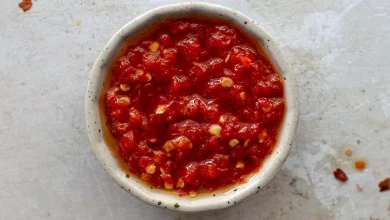🍠 Aloha! Sweet potatoes are a delicious and nutritious starchy root vegetable that has a rich history and can be prepared in various ways. Let’s dive into all the details:
What is it?
Sweet potatoes, scientifically known as Ipomoea batatas, are a type of root vegetable that belongs to the Convolvulaceae family. They are often confused with yams, but they are botanically different. Sweet potatoes come in various colors, including orange, purple, and white, and have a sweet, earthy flavor.
History:
The sweet potato has a fascinating history. It is believed to have originated in Central or South America more than 5,000 years ago. It was a staple crop for indigenous peoples and eventually spread to other parts of the world, including Asia, Africa, and Europe, through exploration and trade. Today, sweet potatoes are enjoyed globally and have become a dietary staple in many countries.
Components:
Sweet potatoes are packed with nutrients, making them a healthy choice. They are a great source of complex carbohydrates, dietary fiber, vitamins (particularly vitamin A and vitamin C), and minerals (like potassium and manganese). Their vibrant orange varieties are particularly rich in beta-carotene, which is a precursor to vitamin A.
Steps to Prepare Sweet Potatoes:
Here’s a simple way to prepare sweet potatoes:
-
Selecting: Choose firm sweet potatoes without soft spots or blemishes. You can opt for the variety that suits your taste, whether orange, purple, or white.
-
Washing: Thoroughly rinse the sweet potatoes under cold water to remove any dirt or debris.
-
Peeling (optional): You can peel sweet potatoes if you prefer, but the skins are edible and nutritious. If you choose to peel them, use a vegetable peeler or a knife.
-
Cutting: Cut the sweet potatoes into your desired shape. Common options include cubes, slices, or wedges.
-
Cooking: There are several ways to cook sweet potatoes:
- Boiling: Place sweet potato pieces in a pot of boiling water and cook until they are tender (about 10-15 minutes).
- Baking: Preheat your oven to 375°F (190°C). Place sweet potato slices or cubes on a baking sheet, drizzle with olive oil, and season with salt and pepper. Bake for 20-30 minutes until they’re soft and slightly caramelized.
- Mashing: Boil sweet potatoes until tender, then mash them with butter, milk, and your favorite seasonings for a creamy side dish.
-
Seasoning: Sweet potatoes can be seasoned to your taste with a variety of options, such as butter, cinnamon, brown sugar, herbs, or spices.
Preparation Time:
The time needed to prepare sweet potatoes depends on the cooking method and the size of the pieces. Here’s a rough estimate:
- Boiling: 10-15 minutes
- Baking: 20-30 minutes
- Mashing: Additional 5-10 minutes after boiling.
So, whether you want them as a side dish, in a pie, or even as fries, sweet potatoes are a versatile and delicious addition to your meals. Enjoy your sweet potato creations! 🍠😊
Certainly! Here’s some nutrition facts and health information related to sweet potatoes:
Nutrition Facts (Per 100g of Cooked Sweet Potato):
- Calories: 86 kcal
- Carbohydrates: 20.1g
- Dietary Fiber: 3.3g
- Sugars: 4.2g
- Protein: 1.6g
- Fat: 0.2g
- Vitamin A: 384% of the Daily Value (DV)
- Vitamin C: 2% DV
- Potassium: 11% DV
- Manganese: 17% DV
Health Information:
-
Rich in Vitamin A: Sweet potatoes are exceptionally high in beta-carotene, which is converted into vitamin A in the body. Vitamin A is crucial for maintaining healthy vision, skin, and the immune system.
-
High in Fiber: The dietary fiber in sweet potatoes aids in digestion, helps maintain steady blood sugar levels, and supports heart health.
-
Antioxidant Properties: Sweet potatoes contain antioxidants like beta-carotene and anthocyanins, which combat oxidative stress and inflammation in the body, potentially reducing the risk of chronic diseases.
-
Good Source of Potassium: Potassium in sweet potatoes helps regulate blood pressure, fluid balance, and muscle contractions.
-
Low in Fat: Sweet potatoes are naturally low in fat, making them a healthy choice for those watching their fat intake.
-
Complex Carbohydrates: The complex carbohydrates in sweet potatoes provide a steady source of energy and can be suitable for individuals looking to maintain stable blood sugar levels.
-
Gluten-Free: Sweet potatoes are naturally gluten-free, making them a safe choice for people with gluten sensitivities or celiac disease.
-
Versatile in Cooking: Sweet potatoes can be prepared in various ways, from baking to boiling to mashing, offering versatility in meal preparation.
-
Promotes Gut Health: The fiber content in sweet potatoes may support a healthy gut microbiome, aiding in digestion and overall well-being.
-
Weight Management: Despite their natural sweetness, sweet potatoes can be part of a balanced diet due to their high fiber content, helping you feel fuller for longer.
Remember that the exact nutritional content may vary depending on the variety of sweet potato and the cooking method used. Incorporating sweet potatoes into your diet can provide a range of health benefits while adding delicious flavors to your meals.



